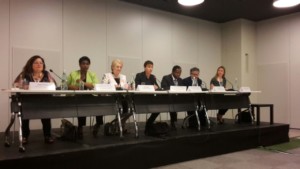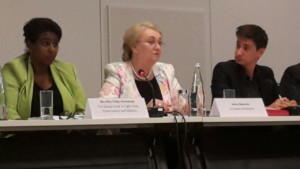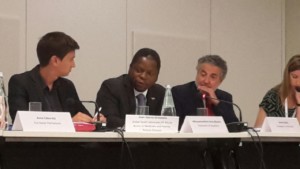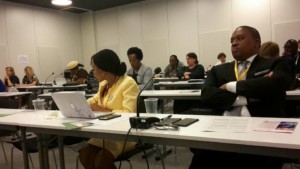Access to affordable essential medicines and vaccines, a key priority of Sustainable Development Goal 3 on health (SDG 3), remains a severe threat for millions of people worldwide. Often, health budgets can no longer cover the costs of extremely high-priced medicines, especially in countries transitioning from donor support. These challenges are becoming pressing in ACP countries transitioning from low to middle-income countries and as foreign donors withdrawing their financial support.
 These were among key topics discussed on Monday 19 June, on the side of the 33rd ACP-EU Joint Parliamentary Assembly taking place in Malta, during a breakfast event Meeting SDG 3: Removing barriers to access to medicines in the fight against infectious diseases, organised by Global Health Advocates together with Stop AIDS Alliance.
These were among key topics discussed on Monday 19 June, on the side of the 33rd ACP-EU Joint Parliamentary Assembly taking place in Malta, during a breakfast event Meeting SDG 3: Removing barriers to access to medicines in the fight against infectious diseases, organised by Global Health Advocates together with Stop AIDS Alliance.
The panel consisted of a wide range of experts and politicians within the field and led to an interesting debate about the main obstacles to equitable access to medicines, the measures that can be taken to remove remaining barriers to attain SDG 3 and to ensure sustainability in ACP countries. Speakers included Hon. Jomo Dlamini (Member of Parliament of Swaziland), Hon. Anna Záborská (Member of the European Parliament), Bruno Gatta (European Commission – DG DEVCO), Shu-Shu Tekle-Haimanot (Senior Specialist Advocacy and Partnerships, The Global Fund to Fight AIDS, Tuberculosis and Malaria), Camilla Bune Sørensen, (Stop AIDS Alliance) and Antonia Formosa (Director Pharmaceutical Affairs, Ministry for Health of Malta). They had the chance to engage in a lively debate with the audience, made of MEPs, parliamentarians from ACP countries and civil society.
 In particular, Hon. Jomo Dlamini and MEP Anna Záborská presented the key recommendations they will outline in their report on “Improving access to basic health systems, notably to medicines for infectious diseases”, currently discussed in the Social Affairs Committee of the ACP-EU Parliamentary Assembly. The report will underline the need to ensure Policy Coherence for Development principles are respected in all sectors having an impact on global health, including development, health, research as well as trade policies. Together with other panellists, they reminded the need for the EU to provide incentives for innovation in the pharmaceutical sector and develop alternative models to find a proper balance between intellectual property rights, innovation, and access to affordable medicines. TRIPS flexibilities should remain a cornerstone in trade policies, and no country should be discouraged from using these flexibilities.
In particular, Hon. Jomo Dlamini and MEP Anna Záborská presented the key recommendations they will outline in their report on “Improving access to basic health systems, notably to medicines for infectious diseases”, currently discussed in the Social Affairs Committee of the ACP-EU Parliamentary Assembly. The report will underline the need to ensure Policy Coherence for Development principles are respected in all sectors having an impact on global health, including development, health, research as well as trade policies. Together with other panellists, they reminded the need for the EU to provide incentives for innovation in the pharmaceutical sector and develop alternative models to find a proper balance between intellectual property rights, innovation, and access to affordable medicines. TRIPS flexibilities should remain a cornerstone in trade policies, and no country should be discouraged from using these flexibilities.
The discussions also focused on the progress made so far in ensuring access to medicines in the fight against infectious diseases. In this regard, the work of The Global Fund was brought as an example of effective partnership, and the 28% increase of the European Commission contribution to the Global Fund in 2016 compared to the previous pledge was underlined as instrumental to the successes of the partnership in the fight against AIDS, Tuberculosis and Malaria. Dr. John F. Kakule, from the Department of Political Affairs and Human Development in the ACP Secretariat, reminded the need for a holistic approach to health systems in the ACP countries to ensure that countries are sustainable and resilient in order not to lose all progress made whenever epidemics occur. The key role of parliamentarians in creating a conducive environment for donors and implementers in-country was underlined.
 Finally, speakers focused on the remaining barriers: an incredible number of people across low- and middle income countries are not receiving the necessary medicines and care, with the result being that a vast number of people die from preventable and treatable diseases. A key concern is donors transitioning out of transitioning middle-income countries, leaving the heavy health financing burden on countries that for the most part are not able to lift it. This is a particular concern for Swaziland, currently a lower middle-income country, whose impressive progress might be endangered when donors pull out.
Finally, speakers focused on the remaining barriers: an incredible number of people across low- and middle income countries are not receiving the necessary medicines and care, with the result being that a vast number of people die from preventable and treatable diseases. A key concern is donors transitioning out of transitioning middle-income countries, leaving the heavy health financing burden on countries that for the most part are not able to lift it. This is a particular concern for Swaziland, currently a lower middle-income country, whose impressive progress might be endangered when donors pull out.
All participants agreed that removing barriers to access to affordable medicines requires common solutions and working closely in partnership is a key step towards this objective.



